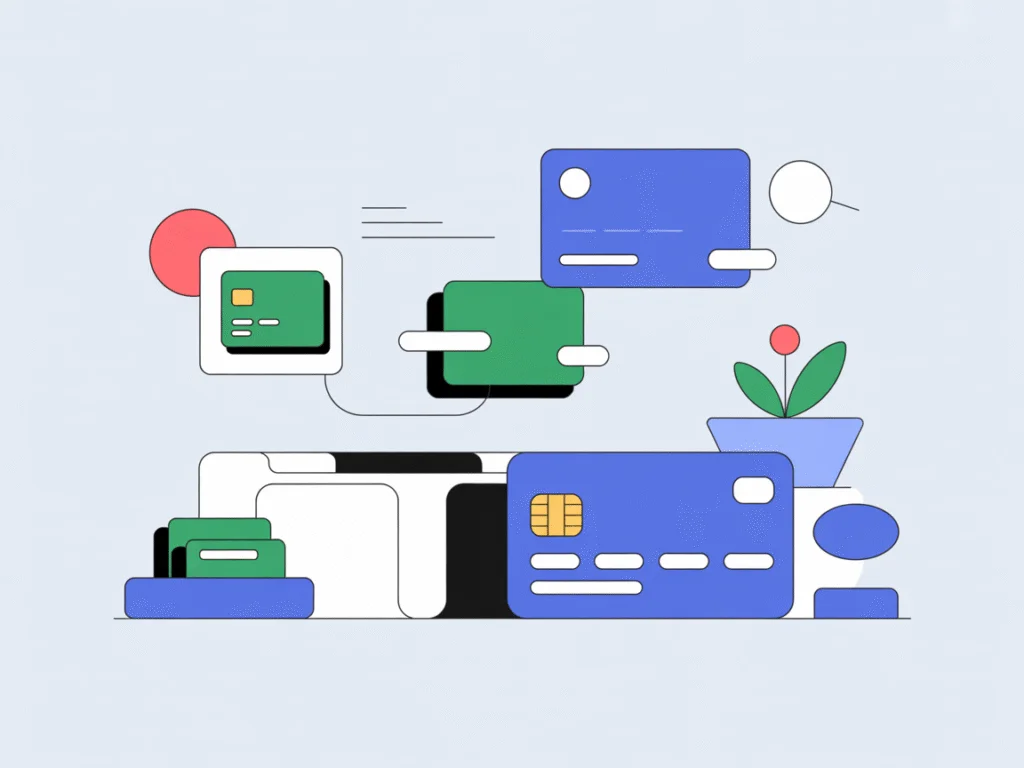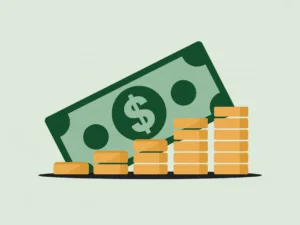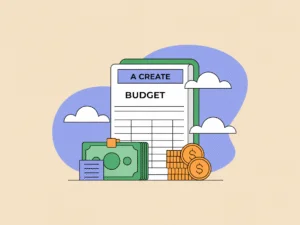Credit cards—they can feel like magic and a trap all at once. Swipe here, tap there, and suddenly you’ve got points, cashback, or airline miles. But swipe too much, or miss a payment, and your financial life can spiral faster than you can say “interest charges.”
The truth is, credit cards aren’t inherently bad. When used wisely, they can help you build credit, manage cash flow, earn rewards, and even protect you in emergencies. But if you’re careless, they can become a debt treadmill.
This guide will show you exactly how to spend smart, pay on time, and manage your card like a pro—without feeling stressed or restricted. Whether you’re a beginner or just want to level up your credit game, you’ll learn practical, actionable strategies to stay financially savvy.

Understanding Credit Cards
What a Credit Card Really Is
A credit card is essentially a short-term loan from the bank. Each time you make a purchase, the bank pays the merchant on your behalf. Then, you owe the bank that amount—ideally, with no interest if you pay it back on time.
Here’s the catch: if you don’t pay your balance in full each month, the bank charges interest, which can grow fast. That’s why understanding billing cycles, interest rates, and minimum payments is crucial.
Think of your credit card like a car. It can take you places efficiently if you drive carefully, but one wrong move, and you crash financially.
Types of Credit Cards
Not all cards are created equal. Depending on your needs and lifestyle, some cards may be better than others:
- Standard Credit Cards: Basic cards with no rewards but simple and straightforward. Perfect for beginners.
- Rewards Cards: Earn points, miles, or cashback on purchases. Great if you pay in full each month.
- Travel Cards: Designed for frequent flyers with perks like free checked bags, lounge access, or bonus miles.
- Student Cards: Tailored for students with lower limits and easier approval.
- Secured Cards: Require a cash deposit as collateral; perfect for building or repairing credit.
Each type has pros and cons, but the common thread is that responsible use trumps fancy perks every time.
How Credit Cards Affect Your Credit Score
Your credit score is basically your financial report card. Using a credit card responsibly affects it in three major ways:
- Payment History (35%) – Making on-time payments consistently builds trust.
- Credit Utilization (30%) – How much of your available credit you’re using. Aim to stay below 30% for the best impact.
- Age and Mix of Accounts (15-20%) – Older cards and diverse credit types boost your score over time.
A high credit score isn’t just bragging rights—it can save you thousands in interest, help you get loans, rent apartments, and even get better insurance rates.
Why Using Credit Wisely Matters
- Avoiding debt: Pay in full and you never owe interest.
- Building credit: Open doors for bigger financial opportunities.
- Earning rewards: Cashback, points, and perks that actually matter.
- Emergency backup: A card can cover unexpected costs when cash isn’t available.
In short, a credit card isn’t the enemy—it’s a tool. The trick is learning how to wield it without letting it wield you.
Building a Good Credit History
Start Small and Use Responsibly
If you’re new to credit cards, start with a low-limit card or a secured card. Think of it as training wheels for your finances. Use it for small, regular purchases—like groceries or gas—and pay it off in full each month. This builds a track record of responsible usage without risking high debt.
Remember: consistent, small wins matter more than risky big moves.
Making Payments on Time
Late payments are like quicksand—they sink your credit score and can cost you serious money in late fees. Set payment reminders or autopay so you never miss a due date. Even one missed payment can stay on your credit report for seven years!
Tip: Treat your credit card like a bill you must pay, not just “extra money.”
Keeping Credit Utilization Low
Credit utilization is the percentage of your available credit you’re using. For example, if your credit limit is $1,000 and you spend $300, your utilization is 30%. Experts recommend staying below 30% to maintain a healthy credit score.
Pro tip: Pay down balances before the statement closes if you need to lower utilization for reporting purposes.
Avoiding Unnecessary Hard Inquiries
Every time you apply for a credit card or loan, lenders do a hard inquiry—a mini check on your credit history. Too many in a short time? It can lower your score.
Be strategic: apply only for cards that meet your needs and space applications at least six months apart.
Spending Smartly
Budgeting for Your Card
Here’s the golden rule: only spend what you can afford to pay off each month. Treat your card like cash—don’t view it as extra money.
Create a mini budget for your card purchases, listing essentials first, then discretionary spending.
Tracking Expenses
Apps and spreadsheets can be lifesavers here. Track every swipe, tap, or online purchase. This prevents “ghost spending”—the kind that sneaks up on you and ruins your budget.
(Related: How to Use the 50-30-20 Budgeting Rule to Take Control of Your Money)
Prioritizing Needs vs Wants
It’s easy to get sucked into thinking that rewards make purchases “free money.” But overspending to earn points is a trap. Always ask yourself: “Do I need this, or do I just want the points?”
A smart spender treats rewards as a bonus, not the main reason for spending.
Making Use of Billing Cycles
Timing your purchases can help with cash flow and rewards. For example, if your statement closes at the end of the month, buying right after can give you nearly a full month before payment is due—interest-free.
Strategically using billing cycles can also maximize category-specific rewards for cashback or points.
Paying Off Your Balance
Always Pay in Full if Possible
The simplest way to avoid interest is to pay off your balance every month. That’s the secret behind truly stress-free credit card use.
Even $1 left unpaid? Interest accrues daily. Pay it off, and you’re basically using a free, short-term loan.
Minimum Payments vs Full Payments
Making only the minimum payment is a trap. It might feel manageable, but it extends debt and increases interest costs dramatically. Always aim to pay full or as much as possible.
Example: A $1,000 balance at 18% APR paying only minimums can take years to pay off and cost hundreds in interest.
Strategies for Paying Off Debt
If you’re juggling multiple cards or balances:
- Snowball method: Pay smallest balances first for psychological wins
- Avalanche method: Pay highest-interest balances first to save money
Both work; choose what keeps you motivated and consistent.
Setting Reminders or Autopay
Automation is your friend. Setting automatic payments prevents late fees and helps you stay disciplined. Even small automation tweaks can prevent a lot of stress and accidental mistakes.
Maximizing Rewards
Cashback Rewards
Cashback cards can feel like free money—but only if you use them wisely. Focus on:
- Category bonuses: Groceries, gas, or dining may offer higher cashback.
- Strategic spending: Only buy what you already planned; don’t overspend for rewards.
Small percentages add up over time—hundreds of dollars annually without extra spending.
Travel Points and Perks
If you travel frequently, travel credit cards can be a goldmine. Benefits often include:
- Free checked bags, lounge access, and travel insurance
- Airline or hotel points for future trips
- Priority boarding and upgrades
Tip: Combine points strategically for maximum value rather than rushing to redeem.
Sign-Up Bonuses
Sign-up bonuses are tempting—sometimes hundreds of dollars or points. But don’t chase bonuses blindly. Ensure:
- You can meet the spending requirement without overspending
- Annual fees don’t outweigh the benefit
Using Rewards Wisely
Avoid “reward chasing” traps. Treat rewards as extra perks, not justification for spending. Smart reward use:
- Pay for everyday expenses you already budgeted for
- Redeem points for items you actually need or planned travel
- Avoid letting rewards expire
Avoiding Common Credit Card Mistakes
- Overspending because of credit limit – Your limit is not extra money.
- Ignoring fees and interest rates – Annual fees, late fees, and APR matter.
- Closing old accounts without thinking – Could shorten credit history and hurt your score.
- Using multiple cards without tracking – Hard to manage payments, risk late fees.
- Racking up debt for rewards – Rewards aren’t worth high-interest debt.
Tools and Apps for Smart Credit Card Use
Expense Tracking Apps
- Mint: Visualize spending and track budgets
- YNAB (You Need a Budget): Helps plan every dollar
- Personal Capital: Track net worth alongside credit
Alerts and Reminders
- Set due date alerts via app or calendar
- Track spending notifications to prevent accidental overspending
Credit Monitoring Services
- Free services: Credit Karma, Experian
- Paid services: Offer deeper insights and alerts for identity theft
Reward Tracking Apps
- Monitor points and cashback automatically
- Helps you redeem rewards efficiently
Advanced Tips for Credit Card Management
- Timing purchases strategically – Align with statement dates for maximum interest-free periods.
- Balancing multiple cards – Use one for essentials, another for rewards. Track each carefully.
- Negotiating interest rates – Call your issuer to ask for lower APR; it works more often than you think.
- Leveraging cards for credit building – Using cards responsibly can open doors for loans, mortgages, or rentals.
Real-Life Examples
Beginner Who Avoids Debt and Builds Credit
A young professional used a $500 secured card for monthly groceries, paid in full, and built a 720+ credit score in 12 months.
Frequent Traveler Maximizing Points
A frequent flyer used a travel card for planned purchases, earned bonus points, and took two free flights in a year.
Family Managing Multiple Cards
Parents used separate cards for groceries, utilities, and travel, tracked via an app, and earned cashback without adding debt.
Young Professional Learning to Budget
By combining credit card budgeting with the 50-30-20 rule, a professional managed lifestyle expenses while building an emergency fund and paying off a small student loan.
FAQs About Credit Card Use
How many cards should I have?
Quality over quantity. One or two well-managed cards are often enough for most people.
Is it okay to carry a balance?
Try to avoid it. Carrying balances accrues interest and slows credit building.
What happens if I miss a payment?
Late fees, higher interest rates, and a negative mark on your credit report.
How can I improve my credit score quickly?
Pay off balances, lower utilization, make all payments on time, and avoid unnecessary inquiries.
Are rewards worth it if I pay interest?
Not at all. High-interest debt usually outweighs rewards—always pay in full first.
Benefits of Being Smart with Credit Cards
- Build excellent credit – Opens doors for loans, mortgages, and better rates.
- Access perks and rewards – Cashback, travel, and lifestyle benefits.
- Flexibility and convenience – Pay for large purchases or emergencies easily.
- Financial security – Backup funds when cash is low.
Conclusion
Credit cards aren’t scary—they’re powerful tools when used wisely. The keys are simple: spend within your means, pay on time, track your expenses, and use rewards strategically.
Start small, stay consistent, and watch your credit score grow, your rewards pile up, and your financial confidence soar.
Take action now: Review your current credit card habits, set up autopay, or pick one beginner-friendly card and start practicing smart spending today. Your future self will thank you.


